Stealth Camping - How To Stay In Your Van For Free

Stealth camping in a van is a practice that combines the freedom of life on the road with the allure of staying hidden from prying eyes.
Stressing over where to sleep shouldn't be your largest concern when living in your van. There are so many options available to you, but you need to do your research before bending the rules while trying to camp for free.
In this comprehensive guide, we will delve into the intriguing world of stealth camping, exploring what it entails, the consequences it can bring, the motivations behind it, and the unwritten rules that govern this unique camping style. We'll also help you identify the best stealth camping spots, highlight places to avoid, recommend ideal vans for the endeavour, and contemplate whether you should keep your stealth campsites a closely guarded secret.
Table Of Contents
What Is Stealth Camping?
The Consequences Of Stealth Camping
The Benefits Of Stealth Camping
The Truth About Stealth Camping
How To Camp Undetected (The Unwritten Rules And Tips)
Best Stealth Camping Spots
Places To Avoid When Stealth Camping
The Best Vans For Stealth Camping
Should You Keep Your Stealth Campites A Secret?
Conclusion
Want to know more about Van Life before getting into this topic? Check out The Definitive Guide to Van Life from Autogenic Amusements:

What Is Stealth Camping?
Stealth camping, often referred to as wild camping, is the art of setting up camp discreetly and unobtrusively, typically in urban or off-grid locations. It involves staying overnight in your vehicle without attracting attention from authorities, landowners, or the public.
Stealth camping is when you flirt with the grey area of legality. Stealth camping is not paying for a site, or using a hosting service like Harvest Host, or Boondockers Welcome since those options mean you're explicitly allowed to be there.
The goal of stealth camping is to enjoy a night's rest remaining unnoticed. This makes it an appealing choice for those who seek adventure off the beaten path. Ideally, you can stealth camp almost anywhere with the right preparation and knowledge.
Whether you're stopping to sleep while on a road trip, or you need to be downtown throughout the week for work, stealth camping is a great way to make your van life more enjoyable.
The Consequences Of Stealth Camping
While stealth camping offers a sense of freedom and adventure, it's not without its risks and consequences. One of the primary concerns is the legal aspect. Many regions have strict regulations against camping in public areas, and trespassing on private property can lead to legal trouble.
If caught, campers might face fines or even have their van impounded, potentially resulting in a disrupted journey and unexpected expenses. You want to avoid any additional troubles or fees.
Here are the main negative aspects of stealth camping that you need to consider:
- Getting "the knock". One of the most feared possibilities is getting a knock on your vehicle doors late at night. If this happens, approach the situation carefully. Never open your doors before checking who is knocking. Speak to them from the front windows of your vehicle. Be ready to drive away quickly. If it's security or police, do what they say, leave the location, and do not return.
- Getting parking tickets, fines, or warnings. Sometimes you might wake up to a note or other negative pieces of paper under your wiper. This is a risk you need to be aware of.
- Rude people. You might park in spots where the local population has a certain disdain for vehicle dwellers, even if you're just passing through. I've been woken up by a vehicle honking its horn at parked vehicles, so be aware this is a possibility. Just remember, if you're being respectful and following the rules of stealth camping, it's unlikely you are the issue.
- Limited activities. When you abide by the unwritten stealth camping rules, you may find yourself limited in what you can do. You probably shouldn't set up your propane fire pit outside or sprawl out on the sidewalk. Similarly, it might not be the best idea to watch a loud movie while trying not to be discrete.
- Overcrowding. Some of the most convenient stealth camping locations might be busy with many other vehicle dwellers. These packed locations usually mean people are getting in and out of their vehicles, pulling up to park, and leaving at all hours of the night. Unfortunately, not everyone respects these places the same. You may find these locations have a lot of garbage and full of those who are loud and inconsiderate.
Chances are that if you're just passing through on a quick overnight, your impact will be minimal. Similarly, if you are just there for the night, you can likely get away unscathed.
The Benefits Of Stealth Camping
The motivations behind stealth camping are as diverse as the individuals who practice it. No matter what kind of van life you're living, you can reap the benefits of this style of overnight parking.
There are plenty of benefits associated with stealth camping. Here are the main ones:
- Closer to what you want. Stealth camping provides a unique opportunity to limit your travel time to wherever it is you need to be. Whether a trailhead for a hike or mere steps away from your office, you can save time and money when you park closer to where you want to be.
- Saving money. Stealth camping means you don't need to pay for your stay. With the average price of a campsite in a national park being between $25 - $60 per night, you stand to save $750 - $1800 a month. Of course, you could stay on BLM land, but then you wouldn't need to stealth camp.
- Quick and Easy access. Once you become comfortable with stealth camping, it becomes incredibly easy to find a spot to pull over for the night. This means you don't need to book something ahead of time or go out of your way to find a Walt-Mart on your travels.
With the current real estate, rental, and camping markets being so expensive, stealth camping provides a much more affordable way to sleep. Stealth camping makes road trips a breeze, and you also get the added benefit of being close to what you want.
The Truth About Stealth Camping
Stealth camping isn't always as glamorous as it sounds. It requires careful planning, a knack for inconspicuousness, and a willingness to adapt to unexpected challenges. The reality is that stealth campers often face discomforts such as limited amenities, exposure to the elements, and the need to constantly be on the lookout for potential disturbances or confrontations.
Moreover, the practice can be mentally and emotionally demanding, as the fear of discovery can cast a shadow over what should be a peaceful night's sleep. To truly enjoy stealth camping, it's essential to be prepared for these challenges and have realistic expectations.
The truth is, it's a calculated risk. You are likely doing something considered illegal. Additionally, there have been many before you who have created a negative stereotype of vehicle dwellers. It's a truth you have to live with while stealth camping.
Due to the popularity of Van Life, it's becoming harder to be truly stealthy. Our vans are giveaways and people often recognize them as campers. Especially when we put stickers on the outsides of our vans of all the places we've been, and we have all of our adventure gear strapped to the outside.
Some say there is no such thing as true stealth camping. Rather, most people are too occupied with their own lives to bother investigating that van parked on the street.
How To Camp Undetected (The Unwritten Rules And Tips)

Stealth camping success hinges on adhering to a set of unwritten rules that prioritize discretion and respect for the environment and local communities.
Having spent over a year living in my van, I've spent a large portion of that time stealth camping. Having only received "the knock" once due to a security guard asking people to leave the parking lot before the store opened, I feel confident that when these guidelines are followed you likely won't have any issues.
Here are the unwritten rules for a successful night of stealth camping:
- Last In, First Out. Arrive after dark, and leave early. Doing so means you can avoid most people's suspicions by never being seen by them in the first place. At spots where you're pushing your luck, use the site only for sleeping. Brush your teeth, change into your sleepwear, and use the bathroom one last time elsewhere than where you're going to sleep.
- Move Frequently. Unless your spot allows multiple night stays, avoid sleeping in the same spot twice in a row. People often don't pay attention to what vehicles are around if they remain unrecognizable. Changing sites nightly can help with remaining unremarkable and as if you're just passing through as opposed to setting up a permanent camp.
- Blackout curtains or window coverings. Keeping light from escaping the back of your van allows you to live more normally while you're parked at night. Additionally, it prevents any light from entering if you're under a streetlight, or are next to a busy road.
- Have a bathroom plan. Using a pee bottle or some form of toilet prevents you from needing to exit your vehicle while you're parked.
- Power in numbers. Be wary of places that are in the grey area of legality and don't have any other vehicles. It might be an indication that people have been kicked out or don't stay for any number of reasons (theft, loud noises, bad neighbourhood.) When you see other vans (not abandoned-looking RVs) parked in a certain location, you can usually be sure it's a safe enough spot to stay.
- Be discrete. There are many ways to stand out less. No signs of your vehicle being a camper like stickers or art, no windows to the back, and no gear on the outside (bikes, surfboards, AC, fans). Not only do these signs give you away, but they also make you a target when you show off that you travel around a lot and might have expensive adventurous gear inside your vehicle.
- Clean your vehicle. Keeping your vehicle as presentable as possible. Keep it clean and it's less likely that people will think you're there to stay versus being a traveller.
- Do not set up outside. Cook and hang out inside your vehicle. You don't want people to know that anyone is occupying the vehicle.
- Keep noise to a minimum. There's no bigger giveaway than loud noises coming from a vehicle parked on a quiet street to give away your location.
- Keep an easy egress. In case the worst comes to worst and you need to take off in a hurry, ensure you can drive away easily. Don't drive into your sites or parallel parks where you can't get out easily.
- Don't create signs of life. All kinds of vehicles can park on the road overnight. Once you start running your heater, fan, wood stove, or AC, you are displaying to the world that someone is sleeping inside the vehicle as opposed to simply being a parked vehicle.
- Pay attention to signage. Don't push your luck by ignoring signs that say no overnight parking. Similarly, you might need to do some research online to identify if a particular area has banned any manner of sleeping in your vehicle.
- Avoid intoxication. If you are confronted by police during your stealth camping, you don't want to be intoxicated since you're still technically in control of the vehicle.
- Sleep with your head away from the road. If possible, it's best to sleep with your head on the side of your van along the sidewalk. If your vehicle is struck by another vehicle at night, you don't want your head in the same place your van will be struck.
- Keep your keys close. Safety should be your first priority. If you ever need to leave abruptly in the middle of the night, you want your keys close by, preferably in the same accessible spot every time.
When you incorporate these principles into your site selection and your nightly routine, you can likely get away with stealth camping in most places. Not only will you be respectful to those around you, but you will also help with keeping these spots open for future travellers and vehicle dwellers.
Best Stealth Camping Spots

Finding the ideal stealth camping spot can be both an art and a science. Urban areas offer numerous opportunities, with quiet side streets, industrial zones, tucked-away parking lots and many more often providing discreet options.
- Street Parking. One of the most plentiful places to stay is street parking. Be mindful of any parking restrictions by first doing a drive-by of the area to make identify any signs prohibiting overnight parking.
- Stores. Certain stores like Walmart, Cabela's, Costco, and other big box stores often allow RVs and campers to park overnight. Take note of any restrictions about the length of stay and check in with the store to ask permission if not explicitly allowed. Additionally, show your love by being a patron of the store for a coffee or grocery order before you head out in the morning.
- Restaurants. Some restaurants like Cracker Barrel often allow travellers to park in their lots overnight.
- Parks. Some parks often have parking lots that draw vehicles that stay for extended periods. These parks can include urban parks, provincial/ state parks and even national parks. The legality of these locations varies quite a bit. Some inner city parks have no enforcement, while some national parks are heavily monitored and regulated.
- Industrial areas and business districts. Other great places to call home for the night are industrial areas and business districts. These locations often have plenty of street parking and tend to be quieter at night since most businesses are closed. You may see security around for the buildings themselves, but they usually won't bother you if you're out of the way and on the street.
- Rest areas. If you're primarily travelling on highways, rest areas offer a convenient respite. Some rest areas have stay duration limits of 8 hours marked on signs, some forbid overnight parking, and some have no signs and instead rely on "should know" bylaws. There's a good chance it's safe to stay if there are transport trucks and other vehicles around.
- Residential areas. Residential areas offer a quiet place to stay. Try and stay around high-density buildings like apartments and condos as opposed to single detached home neighbourhoods. Apartments and condos often have many vehicles around for the tenants and their visitors so you can blend in seamlessly.
- Park and ride lots. Some places have large lots for carpooling and public transit commuting. These lots offer an opportunity for stealth camping since it's common for people to leave their vehicles there overnight.
- Airports. Long-term parking at airports offers a good opportunity for a place to stay if you have a flight in the coming hours. While not entirely free, you can sometimes get away with arriving the night before your flight and paying for a bit of extra time before your flight. Additionally, airport parking lots are a good option since shuttles usually frequent these lots, and security is usually present.
- Casinos. A friendlier place to stay is at casinos. They often love it when travellers stay since it means more income for their business. Some Casinos only require you to register with their security while others require a minimum purchase to stay in their parking lots.
- Hotels. Admittedly, I've never used hotels as a form of stealth camping, but many people have. From my experience, a lot of hotels require you to register your license plate when you stay with them, so it's likely they'd notice a vehicle that isn't supposed to be there.
- Hospitals. Hospitals may provide an adequate location to stealth camp since there can be many visitors and employees who work and frequent the facility at all hours. From my experience, a lot of hospitals often require paying for parking, so explore this option at your discretion.
- Churches. Some churches offer overnight parking to travellers. Additionally, they are usually vacant overnight thus making them a quiet place to park.
- 24/7 gyms. An incredibly convenient location to park for the night is outside of your gym. Especially if it's a 24/7 gym since folks are coming and going at all hours. The most popular gyms like these are Anytime Fitness and Planet Fitness.
Research is paramount in locating the best spots. Online forums, travel apps, and local knowledge can help you discover hidden gems that are perfect for a night's rest. Always remember to leave no trace, respecting the beauty and sanctity of these locations for future campers.
For detailed information on this exact topic, check out this article on finding the Best Spots To Sleep And Stay, and my iOverlander Review!
Places To Avoid When Stealth Camping
While there are plenty of suitable stealth camping spots, some areas are best left untouched. Due to the negative stereotype of some vehicle dwellers, you may be seen as a nuisance. Similarly, van lifers can become targets in certain areas.
To ensure your safety, here are some common places to avoid when choosing to stealth camping:
- Schools. Schools are a grey area on the list of locations you may not wish to stay at. On one hand, they're often quiet at night, but on the other hand, it paints a bag image of a white cargo van being parked nearby.
- High crime rate areas. You should always do your research to avoid the more seedy areas of town. You don't want your windows broken while you're peacefully slumbering. Even while parked at a seemingly safe Cracker Barrel, I've heard gunshots nearby.
- Police stations. You'll want to avoid stealth camping near police stations since there is usually a constant flow of prying eyes driving near these locations.
- Entertainment districts. Not only do you want to avoid bar districts due to their obvious late-night noise and activity, but your van might also become somewhere for intoxicated individuals to relieve themselves or be part of an altercation.
- Highly popular national parks. While you may be able to get away with parking in some smaller national parks, the larger and more popular ones will often have a lot of surveillance for people who are trying to camp for free.
- Encampments. Unfortunately, not all vehicle dwellers have chosen this style of living by choice. While you may come across what seems like a safe place with many vehicle dwellers, you don't want to join in on a homeless encampment.
Sticking to the tried and true camping spots is a safe bet. By avoiding the above areas, you can help ensure you have a seamless experience while stealth camping.
The Best Vans For Stealth Camping

Choosing the right van for stealth camping is pivotal to your comfort and success. These vans offer varying spaces for sleeping and storage while they may maintain a relatively inconspicuous appearance.
- Cargo Vans (Promaster, Sprinter, Transit, NV). When you sleep in a self-converted cargo van, you can choose the exterior adornments to be as stealthy as you like. Another benefit is that, with the right light discipline, you're able to still move around and do what you wish from the confines of your self-converted van.
- Minivans (Grand Caravan, Oddysey, AstroVan). While these types of vans blend the best into a public space, they have their challenges when trying to stealth camp. It's hard to enjoy your time if you're not sleeping but trying to remain stealthy in these vans since their living space usually has windows all the way around, and you don't have much standing room.
- Campers (Revel, Winnebago, Coachmen, Roadtrek). This category will obviously be the least stealthy of any van since these types of vans are made to be campers, and it often shows. With their numerous ports on the outside for power, water, etc., a large number of windows, the "over-the-top" decals and the large AC units, they stick out like sore thumbs. Of course, it's not a guarantee that someone is inside a camper every time you see one, but it's likely.
When outfitting your van, consider a minimalist interior design that allows for flexibility and easy transformation from a living space to a sleeping area. Install blackout curtains or window coverings to ensure privacy and concealment at night. Additionally, invest in a reliable power source, such as a solar panel or secondary battery system, to meet your electrical needs without drawing attention.
Should You Keep Your Stealth Campites A Secret?
One question that often arises among stealth campers is whether to share the locations of their favourite spots. The answer depends on your perspective and the impact you want to have on these places.
Some campers choose to keep their favourite spots secret to prevent overcrowding, environmental degradation, or potential changes in local regulations.
On the other hand, sharing your experiences and knowledge can build a sense of community among fellow adventurers. It can also lead to the discovery of new, less-visited spots, spreading the impact and relieving pressure on popular areas.
Ultimately, the decision to share or keep secrets is a personal one, guided by your values and goals as a stealth camper.
Take a look at this video from Van City Van Life about a popular Walmart becoming banned from campers and RVs due to the misuse of the parking terms:
Conclusion
Stealth camping in a van offers a unique blend of adventure, freedom, and self-reliance. As you embark on your journey into this captivating world, remember the importance of respecting the environment, local communities, and the laws that govern the places you visit.
Balancing the thrill of evading the norm with responsible and ethical behaviour is the key to ensuring that stealth camping remains an enjoyable and sustainable pursuit for future campers.
I'd love to hear from you!
Do you have any stealth camping rules you incorporate into your routine? Any hidden gems that you want to share? Leave a comment to let me know!


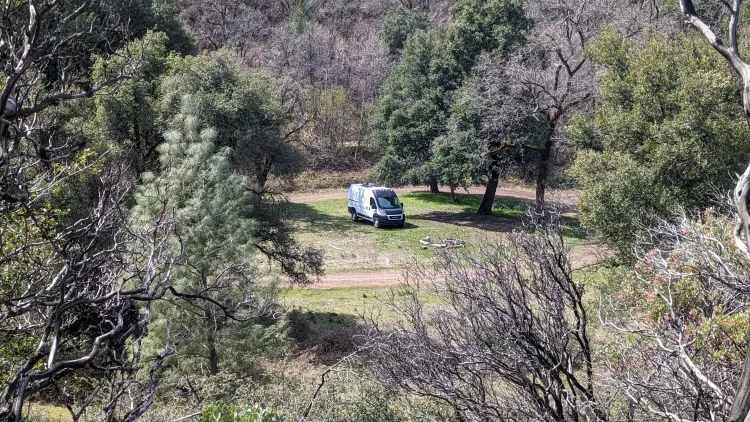
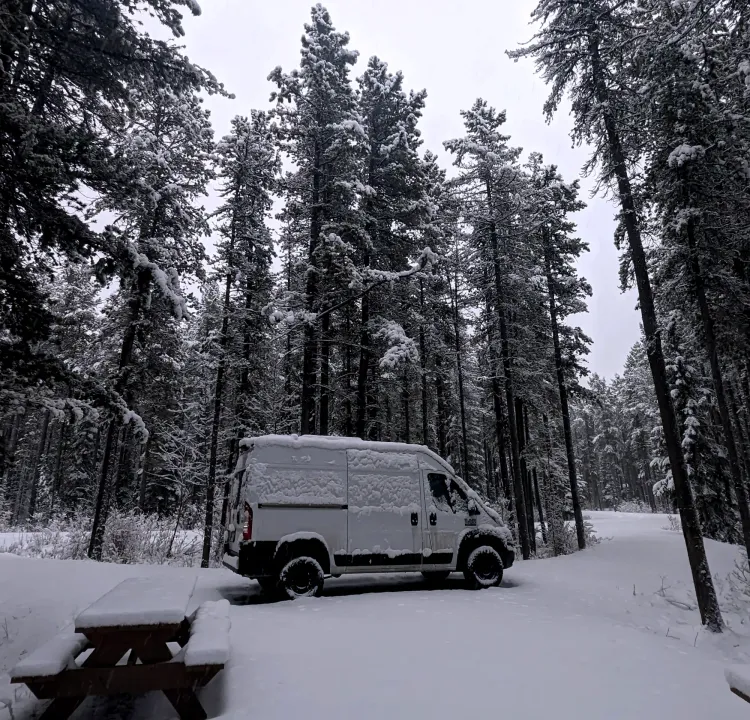
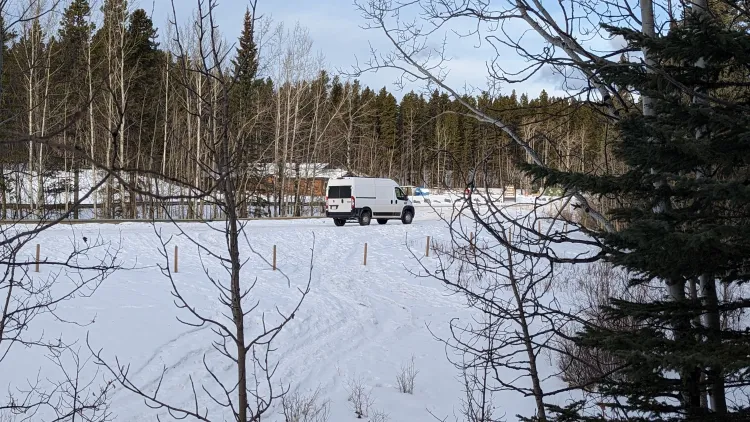
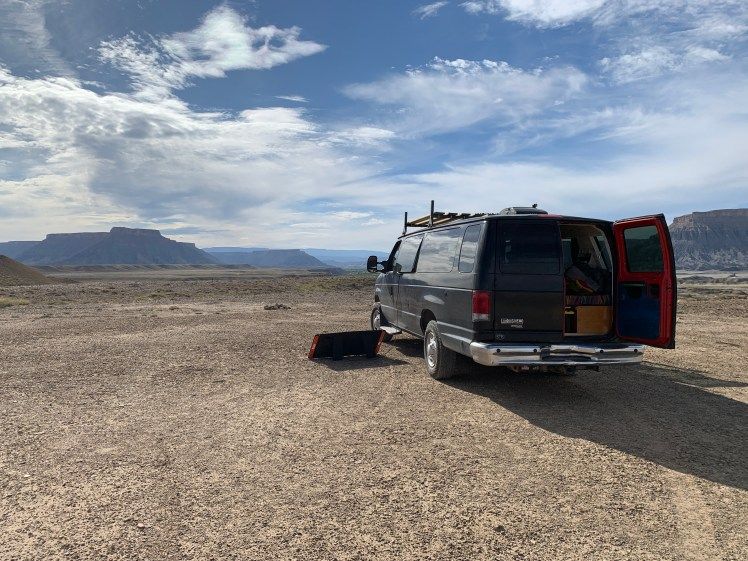
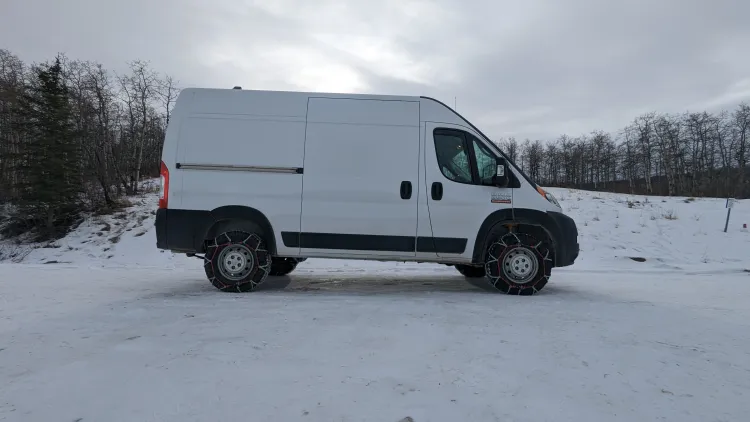
Member discussion